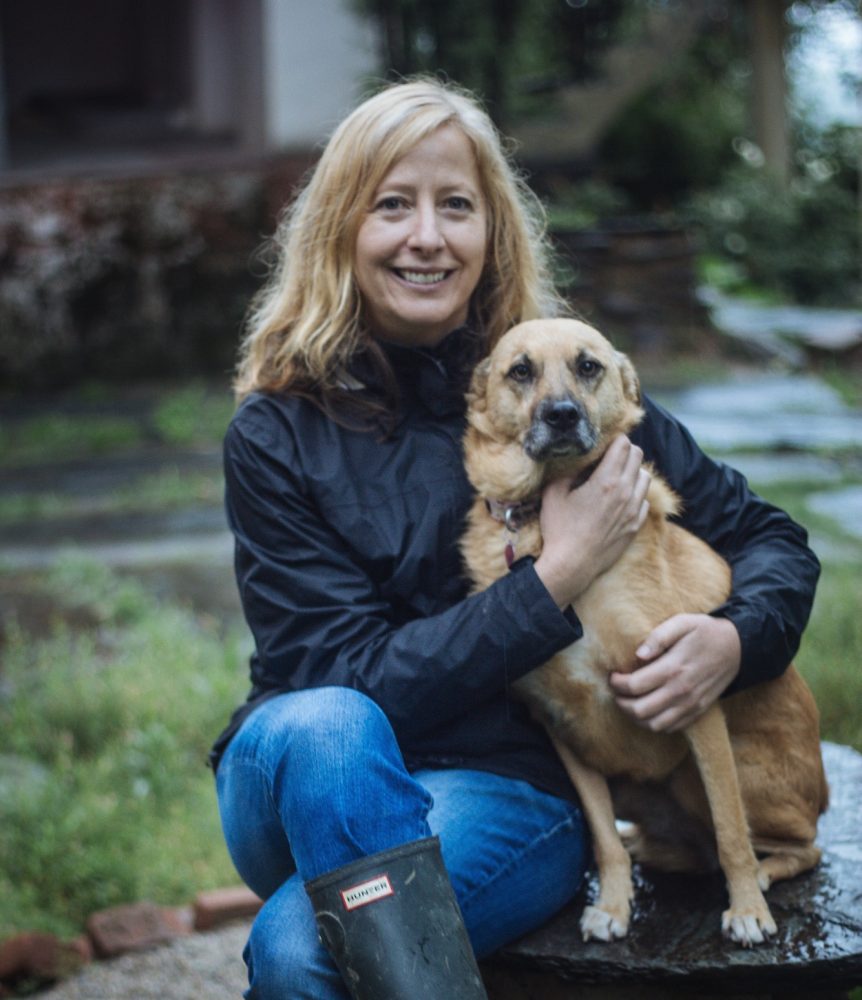
As Deb Jarrett was approaching 40, she decided to do something drastic: She quite her job, moved to a remote mountainous area in India and began teaching pre-school. As she adjusted to the culture shock and her new life, she couldn’t get over the huge numbers of street dogs she saw everywhere. As she learned more about the scale of the problem (35 million street dogs in the country with no government program to vaccinate or neuter the dogs) she decided to do something herself. What has emerged is Dharamsala Animal Rescue. Her rescue shelter vaccinates dogs against rabies, neuters, rescues and also provides adoption services. But most importantly for Jarrett, they empower local women by hiring them and giving them a means to become financially independent in a very patriarchal culture.
Jarrett’s story, as told to The Story Exchange 1,000+ Stories Project:
When I was about to turn 40, I decided I needed to do something that would really expand my horizons. My life was good, but something was missing. A feeling of making a true contribution on this planet was lacking deep down inside of me. The need to fill that void led me to Dharamsala, India to spend several weeks volunteering at a preschool. Working with the children proved completely overwhelming, as did the chaotic culture of India. What truly got to me, however, was seeing an injured and bloody dog lying in the temple where the school was held, apparently left to die. It broke my heart to watch the dog suffer — and to see how little the local people seemed to care about his condition. I was saddened by the reactions, and felt helpless. Incredibly, my path crossed with a local man who knew someone who could help. Miraculously, my actions and concern sparked a change. The locals became involved in the dog’s recovery. I wanted to see if I could repeat this pattern and see more change happen. You can watch my 2018 Tedx Talk here where I tell this story.
Since then I have started Dharamsala Animal Rescue, which works to reduce the human/street dog conflict in India. India has the highest amount of street dogs in the world: 35 million. It also has the highest incidence of human deaths by rabies at 36% of the worlds deaths, which is about 20,000 people year. There are no national programs for spaying, neutering or vaccinating the dogs, which in turn is creating extreme suffering for dogs and for humans. We seek a humane and sustainable environment for animals with direct benefits to the people of Dharamsala, India through our programs for animal birth control, rabies vaccines, rescue, education, and adoption.
[Related: How a NYC Business Owner (and Dog Lover) Is Coping]
Honestly, as of today, I feel successful. I quite a job in 2012, where I was the Sales Engineering Manager making good money and living in San Francisco. I moved to India, blew my savings, and somehow created a street dog rescue in a small developing country mountain town. Along with that, I learned about a different culture, empowered women, supported families in need, realized just how privileged we are to be born in the United States where basic needs like clean water are readily available. I left India in 2019 after finally getting a good team in place so I could focus more on fundraising. In just 1.5 years, we have expanded and I now can finally pay myself a salary to live. It by no means has been easy, but it for sure has not been boring. So I guess my definition of success, is teaching new skills to people, and empowering them to help their community, take pride in their jobs, and in turn, cover all of our financial and emotional needs so we can continue the work.
Helping over 16,500 animals in the past decade while empowering locals to take the task on themselves is my biggest success to date. When I started Dharamsala Animal Rescue, I never wanted to be the American going in to another country telling them everything they did wrong and what I do right. Reading Nicholas Kristoff in the New York Times for year, I learned that the best way to see change happens, is to empower locals who also want to see that change. The USA has done this too many times and failed. Every culture is different, and there is always something we can learn from one another.
Finding the right people is not easy. I was taken advantage of a lot. My first attempt led to me to work with disingenuous people who just wanted to make money off of white people’s sympathy for sick and injured dogs. I ended up in court and being harassed. However, I did find the right people. And now that community has grown. There are still bad apples in the mix, but for the most part, we have seen a huge change in how the community treats street dogs and the locals have become the heroes. I could not ask for more. Well I could, but for now, this is great!
I lived in India from 2012 to 2019. For most of the time I was consumed with getting DAR off the ground, however, I was also overwhelmed with the culture and the corruption which caused a mental overload on a daily basis. I did have a great support group, boyfriend and friends, however, Indians work on Saturdays – so there was no weekend. I ended up also working more. I was also dealing with days without water, power, monsoon season, and no central heating in the winters. My health suffered due to stress, lack of nutrients in food, dealing with employees issues which included two employees dying at the ages of 29 and 25 because of poverty and gender.
I came home in February of 2019 and I have found much more of a balance. The plan was to visit India twice a year. I was in India for a month in October 2019 and for 2 weeks in March 2020 when I had to come home due to COVID-19. Now life is a bit off balance in the other direction. I’m stuck working from home with no timeline on when I can return to Dharamsala. In the mean time Zoom meetings with in-country staff and collaborators, and online Cooking Fundraisers have helped!
The most significant event that has taken place while running this business is one that made me realize that our work is not just about animals. I realized I needed to focus on truly empowering local Indian women with our work. At the end of 2016, Parveen Kumar, a lovely man of 29 years old who I had worked with and known for 7 years, died in an Indian hospital from poor post op care from a gall bladder surgery. The devastation of his death was one thing, but then, he left his wife, father, and other extended family without income as he was the sole provider in their village home.
It became clear that we needed to help his family. We ended up offering his wife a job who we knew was an animal lover, smart, and did not want to be at home thinking about the loss of her husband. His sister also wanted to come volunteer. They both wanted to be at a place that he loved. His wife, 4 years later, is a different person. She came to us as a shy, young widow of 22. She now is our most reliable employee and is an empowered independent woman. She even just got remarried to man she chose for love, something not very common for village Indian women. Today, we have more women working at DAR than men. All of them come to work knowing they are supported and encouraged, and realizing that they do not have to follow societies rules, that they can forge their own path, and DAR is there for them every step of the the way.
[Related: These 4 Indian Female Pilots Just Flew Country’s Longest Non-Stop Flight]
My mom is my most important role model. My mother was born in 1941. She was told to go to school, get married, work till you have kids, then stop working. She did as she was told. Then woke up at age 30 with 3 kids and had a “nervous breakdown” which is what they called it in those days. She instilled in me feminist ideals from a young age, not always in her words, but in her behaviors. I remember seeing her cringe when we would go to Temple and women had to sit away from the men, and only men were counted as attendees. When I was older and in college, and had been dating my boyfriend for 3 years, she guided me towards not get married until I was at least 30. She wanted me to find myself. Figure out who I was and what I wanted was first and foremost in life. I watched her recover from her nervous breakdown, go back to get her masters in Accounting, her CPA, and work in a job she loved until she retired 4 years ago. She gave me the confidence that I could do anything…and that you can reinvent yourself at any age.
Share your story!
Check out our Advice + Tips for entrepreneurs starting-up
Watch our latest videos
Subscribe to our podcast


